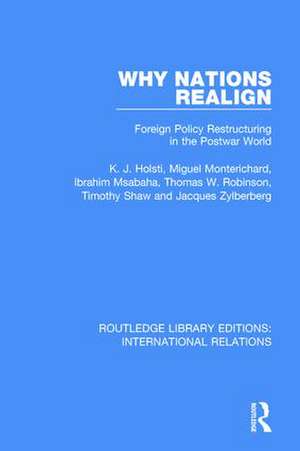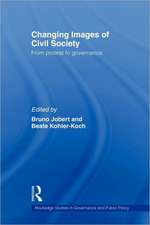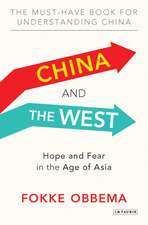Why Nations Realign: Foreign Policy Restructuring in the Postwar World: Routledge Library Editions: International Relations
Autor K. J. Holstien Limba Engleză Paperback – 29 aug 2017
| Toate formatele și edițiile | Preț | Express |
|---|---|---|
| Paperback (1) | 232.14 lei 6-8 săpt. | |
| Taylor & Francis – 29 aug 2017 | 232.14 lei 6-8 săpt. | |
| Hardback (1) | 947.90 lei 6-8 săpt. | |
| Taylor & Francis – 13 oct 2015 | 947.90 lei 6-8 săpt. |
Preț: 232.14 lei
Preț vechi: 279.85 lei
-17% Nou
Puncte Express: 348
Preț estimativ în valută:
44.42€ • 47.50$ • 37.04£
44.42€ • 47.50$ • 37.04£
Carte tipărită la comandă
Livrare economică 17 aprilie-01 mai
Preluare comenzi: 021 569.72.76
Specificații
ISBN-13: 9781138940086
ISBN-10: 1138940089
Pagini: 238
Dimensiuni: 156 x 234 x 19 mm
Greutate: 0.32 kg
Ediția:1
Editura: Taylor & Francis
Colecția Routledge
Seria Routledge Library Editions: International Relations
Locul publicării:Oxford, United Kingdom
ISBN-10: 1138940089
Pagini: 238
Dimensiuni: 156 x 234 x 19 mm
Greutate: 0.32 kg
Ediția:1
Editura: Taylor & Francis
Colecția Routledge
Seria Routledge Library Editions: International Relations
Locul publicării:Oxford, United Kingdom
Public țintă
General, Postgraduate, Professional, and UndergraduateCuprins
Introduction. 1. Restructuring Foreign Policy: A Neglected Phenomenon in Foreign Policy Theory K. J. Holsti 2. From Isolation to Dependence: Bhutan, 1958-62 K. J. Holsti 3. From Dependence to Diversification: Tanzania, 1967-77 Timothy M. Shaw and Ibrahim S. R. Msabaha 4. From Dependence to Diversification: Canada 1972-8 5. From Diversification to Isolation: Burma, 1963-7 K. J. Holsti 6. Restructuring Chinese Foreign Policy, 1959-76: Three Episodes Thomas W. Robinson 7. An Abortive Attempt to Change Foreign Policy: Chile, 1970-3 Jacques Zylberberg and Miguel Monterichard 8. Restructuring Foreign Policy: A Comparative Analysis K. J. Holsti
Descriere
This book, originally published in 1982, analyzes the process of radical foreign policy change – how states restructure their foreign relations, and why they do so. Using a common analystical framework, the authors examine Bhutan, Burma, Canada, Child, China and Tanzania. They distinguish between piecemeal foreign policy change and adaptation, and the fundamental re-ordering of foreign policy. Their analysis underlines the extent to which non-military and sometimes imagined threats, such as dependency and external economic and cultural penetration, can constitute an important cause of radical realignment activity.























